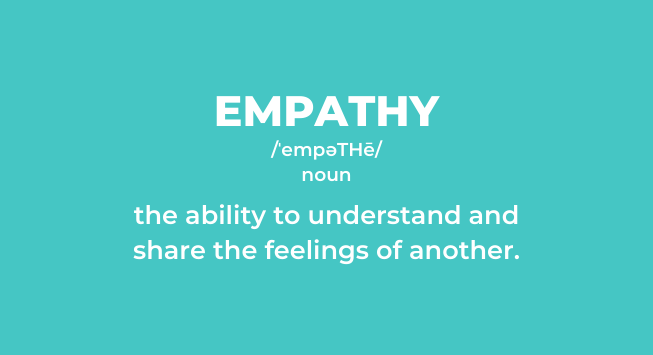Start From Within: How To Be More Empathetic In Your Practice
.png)
This is one in a series of blogs, Start From Within, where we’re tackling some of the ‘softer’ parts of being a doctor, ones that you didn’t learn in medical school: healthcare inequity, the elements of professionalism as a doctor, what to do when patients have a bias against you, etc.
Our mission is to make learning medicine easier. But we know it’s not just how you learn medicine—the way you apply your knowledge in clinical settings is immensely important, too. This blog series is meant to help you navigate the patient situations you face daily and improve your patient care.
Why Empathy is Important to Your Practice

The definition of empathy
Empathy in your medical practice is powerful in building patient trust and improving health outcomes. Research shows that great physician-patient communication is associated with better adherence to patient plans, increased patient satisfaction, and fewer mistakes.
So, why isn’t every doctor pursuing empathy as a professional skill? The reality is, physicians have a lot on their plates. And, we’ve been taught the medical definition of empathy: detachment cognition. We strive for emotional detachment so that we can treat all patients fairly, regardless of our personal feelings. Investing in our patients’ emotions, we’re taught, will interfere with the clinical assessment and our objectivity.
Cognitive and affective empathy both belong in your practice, and physicians should understand each so they can combine them appropriately in clinical situations.
Start From Within: How To Be More Empathetic Towards Your Patients
Research has found that patients who feel understood and accepted—empathized with—are more satisfied with their care. However, you’re feeling burnt out and don’t have time for additional training on empathy and interpersonal skills. How can you inject more empathy into your practice? The key is to start from within. Take the following tips, and try to apply them in your clinical setting and see what a difference it makes to go from cognitive to affective empathy.
Take Cues From Your Patients’ Tone
If a patient tells you they stopped taking a medication, you have two options. You might review your mental checklist of the common reasons patients stop taking their medications and start asking your patient questions like, “Are you experience side effects?” or “Are you still feeling symptoms?”
If you step back and bring affective empathy into the conversation, you're working to understand the reason behind why they stopped taking the medication: is the patient frustrated with the side effects? Are they overwhelmed by the timing protocols? Maybe the patient is unsure the medication will work for them.
With questions like “How are you feeling?” you work to understand their feelings and revise treatment. Your patient feels more understood and is more likely to commit to the health plan you put in place.
.png?width=653&name=maddy%20blog%20images%20(43).png)
Empathy is important in patient interactions because it increases the ‘humanness’ of your practice
Treat Your Patients Like Your Family
When administering care, it’s tough to remember how a patient is feeling: hopeless, confused, etc. Do what you can to preserve their dignity. Address them by their name, knock before you enter the room, involve them in their care plan, or grab an extra blanket if they’re cold.
There are many ways you can personalize your patient interactions—this isn’t a comprehensive list.
Understand Your Patient’s Culture
Take time to expand your cultural awareness and sensitivity—you’re already on the right track with this blog series! Try to understand your patient population and their perception of doctors and medical environments, as well as any preconceived notions they (and you!) might bring to the clinical interaction.
Taking the time to learn more about empathy in healthcare and how you can bring even more humanness into your practice will increase patient satisfaction—and it should also help prevent burnout.
To follow along with our Start From Within blog series, join our community of 300,000+ physicians who get regular study tips, medical news, and MedStudy updates.


